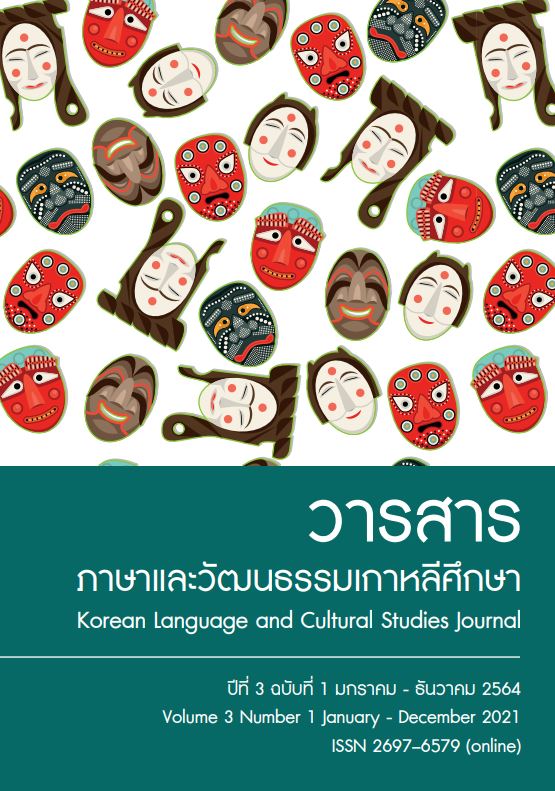A Little Change in Point of View Makes Life Better Adolescent Behavior Modification from “Me” to “Giving” to Others
Main Article Content
Abstract
This article was written with the aim of studying the Korean young adult fictional story, “Come! I’ll Help You,” which is the work of Han Sangbok translated by Soontree Larprungrun. Come! I’ll Help You is Korean young-adult fiction that presents the characteristics and behavior of Korean young adults in terms of emotional disorders in the first chapter before learning about living with other people in order to grow into a good adult. The findings of this study revealed that the main character in this young-adult fiction is Wi Yena or Yena, a self-centered girl until she learns about the lives of the people around her such as her exhausted mother, friends in a volunteer group, school friends and teachers. Eventually, she understands the meaning of the term “giving” to others and its mental value. The important thing is that this young adult fiction does not tell only the picture of how Yena has to give up her selfishness in order to give to others. The author of this literature also inserted the behaviors of other characters to show that selfishness is in every area, class and age. Therefore, this young adult fiction is not only valuable in terms of its presentation of children’s behaviors in becoming selfish to the point of forgetting other people, but also as a place to tell that even adults can engage is selfish behavior.
Article Details
References
กอสวามี, อูชา. (2562). จิตวิทยาเด็ก: ความรู้ฉบับพกพา (สุภลัคน์ ลวดลาย วรัญญู กอง ชัยมงคล, ผู้แปล). กรุงเทพฯ: บุ๊คสเคป.
คีซู, อึน. (2559). ค่านิยมของชาวเกาหลีใต้ (พรรณิภา ซอง, ผู้แปล). กรุงเทพฯ: สำนักพิมพ์จุฬาลงกรณ์มหาวิทยาลัย.
จินตนา พุทธเมตะ. (2548). คุณลักษณะและกระบวนการปลูกฝังคุณธรรมจริยธรรมของประเทศเกาหลี. กรุงเทพฯ: ศูนย์ส่งเสริมและพัฒนาพลังแผ่นดินเชิงคุณธรรม.
ชลธิรา สัตยาวัฒนา. (2513). การนำวรรณคดีวิจารณ์แผนใหม่แบบตะวันตกมาใช้กับวรรณคดีไทย. วิทยานิพนธ์ปริญญามหาบัณฑิต แผนกวิชาภาษาไทย บัณฑิตวิทยาลัย จุฬาลงกรณ์มหาวิทยาลัย.
ดำรงค์ ฐานดี. (2536). วัฒนธรรมและพฤติกรรมทางเศรษฐกิจ เรื่องการบริหารงานแบบเกาหลี. กรุงเทพฯ: สำนักพิมพ์มหาวิทยาลัยรามคำแหง.
__________. (2547). สังคมและวัฒนธรรมเกาหลี. กรุงเทพฯ: สำนักพิมพ์มหาวิทยาลัยรามคำแหง.
ทิวดอร์, แดเนียล. (2560). มหัศจรรย์เกาหลี: จากเถ้าถ่านสู่มหาอำนาจทางเศรษฐกิจและวัฒนธรรม. กรุงเทพฯ: โอเพ่นเวิลด์ส พับลิชชิ่ง เฮาส์.
นิตยา วรรณกิตร์. (2562). วรรณกรรมสำหรับเด็ก. นนทบุรี: อินทนิล.
ภาณี รูปสม. (2545). การอบรมเลี้ยงดูเด็กในสังคมเกาหลี. ใน วรพล พรหมิกบุตร (บ.ก.), เกาหลีในโลกา ภิวัตน์: ปัจจุบันและแนวโน้มศตวรรษที่ 21 (น. 53-61). ปทุมธานี: โครงการเกาหลีศึกษา สถาบันเอเชียตะวันออกศึกษา มหาวิทยาลัยธรรมศาสตร์.
มุนฮย็อนนา. (2560). การเปลี่ยนแปลงของเศรษฐกิจเกาหลีและการเปลี่ยนแปลงโครงสร้างครอบครัวเกาหลี (พรรณิภา ซอง, ผู้แปล). กรุงเทพฯ: สำนักพิมพ์จุฬาลงกรณ์มหาวิทยาลัย.
ราชบัณฑิตยสถาน. (2556). พจนานุกรมฉบับราชบัณฑิตสถาน พ.ศ. 2554. กรุงเทพฯ: ราชบัณฑิตยสถาน.
ฮันซังบก. (2552). มามะ ! ฉันจะช่วยเธอ (สุนทรี ลาภรุ่งเรือง, ผู้แปล). กรุงเทพฯ: นานมีบุ๊คส์พับลิเคชั่นส์.


